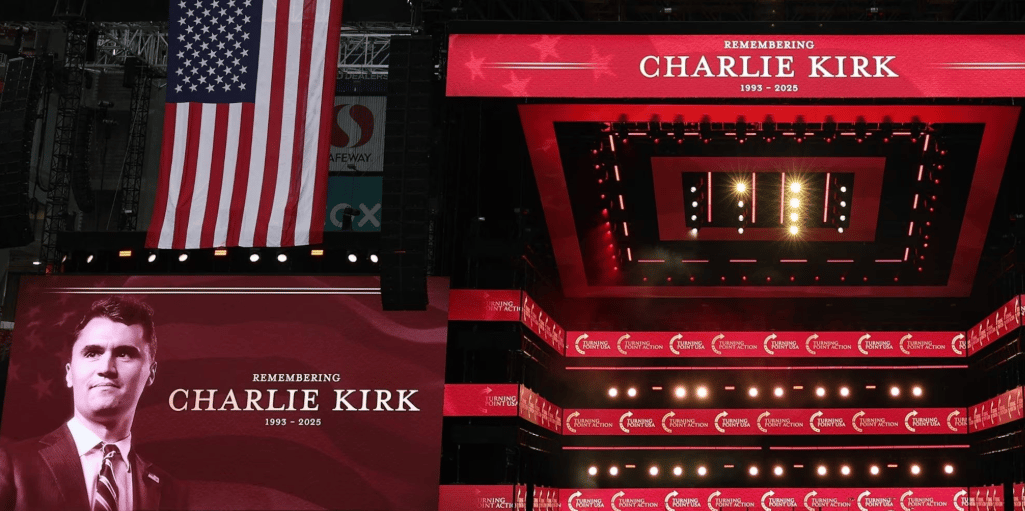- American Realist
- Posts
- They Tried To Silence Him, Instead They Woke Up The Majority
They Tried To Silence Him, Instead They Woke Up The Majority
These numbers are staggering.
Receive Honest News Today
Join over 4 million Americans who start their day with 1440 – your daily digest for unbiased, fact-centric news. From politics to sports, we cover it all by analyzing over 100 sources. Our concise, 5-minute read lands in your inbox each morning at no cost. Experience news without the noise; let 1440 help you make up your own mind. Sign up now and invite your friends and family to be part of the informed.

The numbers speak for themselves.
The numbers are mind-blowing. Following the tragic assassination of Charlie Kirk on not even two weeks ago at Utah Valley University, Charlie’s grassroots organization Turning Point USA (TPUSA) has seen an unprecedented surge in interest, with inquiries for new high school and college chapters more than doubling from 60,000 to over 120,000. This explosive growth, announced in the wake of a massive memorial held at Arizona’s State Farm Stadium, underscores a remarkable turn of events: what far-left activists intended as a silencing of a prominent conservative voice has instead ignited a wildfire of support among young Americans.
Andrew Kolvet, Charlie’s best friend and second-in-command at TPUSA, confirmed these staggering figures, calling it “a testament to Charlie’s vision and the resolve of a generation that refuses to be silenced.” Far from quelling the conservative movement, the left’s actions have awakened a sleeping majority, proving that the attempt to suppress Kirk’s influence has only amplified his legacy.
🚨 HOLY CRAP! Turning Point USA has MORE THAN DOUBLED their new inquiries for high school and college chapters, going from 60,000 to OVER 120,000 following Charlie's memorial in Arizona, per @AndrewKolvet.
The movement is surging. The energy is REAL! 🇺🇸
"We are on the cusp of
— Eric Daugherty (@EricLDaugh)
8:49 PM • Sep 23, 2025
Charlie Kirk, the charismatic founder of TPUSA, was a polarizing figure whose unapologetic advocacy for conservative values made him a target for progressive ire. His assassination, carried out during a speaking engagement, was quickly seized upon by some on the far left as a chance to discredit his movement and dismantle his organization. Yet, the response from the public has defied those expectations. The memorial event, attended by tens of thousands and broadcast widely, transformed into a rallying cry, with images of a packed stadium and Kirk’s image dominating the stage serving as a powerful symbol of resilience. Kolvet, speaking on behalf of TPUSA, emphasized that this surge reflects not just grief but a collective determination to carry forward Kirk’s mission. “They thought they could end his voice with violence,” Kolvet said, “but instead, they’ve woken up a majority that’s ready to fight for what Charlie stood for.”
This phenomenon aligns with a broader historical pattern where martyrdom galvanizes movements. The death of a leader often serves as a catalyst, turning personal loss into collective action. In Kirk’s case, his influence—built through years of engaging college students and challenging campus orthodoxy—has transcended his physical presence. The doubling of chapter inquiries suggests that his ideas, rather than being buried with him, are resonating more deeply than ever. TPUSA’s goal of establishing a chapter in every high school and college campus in America, once a bold ambition, now seems within reach, driven by a grassroots energy that the left failed to anticipate. This shift challenges the narrative that conservative ideology is losing ground among younger generations, revealing a latent majority that had been underestimated.
The left’s miscalculation stems from a fundamental misunderstanding of Kirk’s appeal. His ability to connect with young people through direct engagement, social media, and a clear articulation of conservative principles created a loyal following that the far left sought to suppress. Instead of diminishing his impact, the assassination has elevated him to a symbol of resistance. The memorial’s scale—featuring a sea of supporters, American flags, and a stage adorned with Kirk’s image—demonstrated the movement’s strength, turning a moment of tragedy into a platform for renewal. Kolvet noted that the influx of new chapter sign-ups includes students from diverse backgrounds, suggesting that Kirk’s message transcended traditional political boundaries, appealing to a broader swath of the population than his critics acknowledged.
The awakening of this majority is not just about numbers; it’s about a cultural shift. The far left’s strategy of silencing dissent through intimidation has backfired, revealing a resilience among conservative youth that was previously underestimated. Andrew Kolvet’s leadership, bolstered by the memory of his friend, positions TPUSA to capitalize on this moment, turning a tragic loss into a transformative victory. As the movement grows, it serves as a stark reminder that attempts to suppress free expression can, paradoxically, amplify the very voices they seek to quiet. In the end, Charlie Kirk’s death may well be the spark that ignites a new era of conservative activism, proving that the majority he inspired is far from silent.



